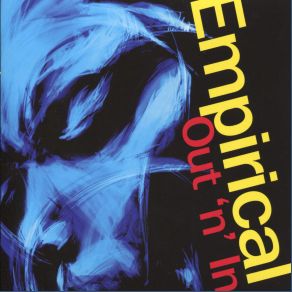Out 'n' In
Download links and information about Out 'n' In by Empirical. This album was released in 2011 and it belongs to Jazz, Vocal Jazz genres. It contains 11 tracks with total duration of 58:50 minutes.

|
|
|---|---|
| Artist: | Empirical |
| Release date: | 2011 |
| Genre: | Jazz, Vocal Jazz |
| Tracks: | 11 |
| Duration: | 58:50 |
| Buy it NOW at: | |
| Buy on iTunes $9.99 | |
Tracks
[Edit]| No. | Title | Length |
|---|---|---|
| 1. | Out But In | 5:18 |
| 2. | Hat & Beyond | 8:15 |
| 3. | A Conversation | 1:49 |
| 4. | So He Left | 5:32 |
| 5. | A Bitter End for a Tender Giant | 6:49 |
| 6. | Dolphyus Morphyus | 10:43 |
| 7. | Interlude | 0:43 |
| 8. | Gazzelloni | 5:46 |
| 9. | Syndicalism | 6:35 |
| 10. | Another Conversation | 1:17 |
| 11. | Bowden Out | 6:03 |
Details
[Edit]In jazz parlance, an "out" tune is one that is particularly challenging to the ear — it may have an especially counterintuitive chord progression or spiky melody; it may be partly or largely improvised; or it may be so rhythmically intricate that it's hard to follow. There have been many jazz musicians, particularly since the fading of the original bebop era in the 1950s, who have explored the "outer" territories of the genre, but few have retained as much respect among musicians as the great saxophonist, flutist, and bass clarinetist Eric Dolphy. On their second album, the quartet Empirical pay homage to Dolphy with two rearrangements of his compositions ("Hat & Beard" and "Gazzelloni"), and nine originals that draw deeply on his influence. It's a great tribute to this group's originality and virtuosity that they are able to write in a Dolphy-influenced style without sounding either like slavish imitators or parodists: their take on Dolphy's sprawling "Hat & Beard" is both sharp and swinging, with the walking bassline played by guest musician Julian Siegel on bass clarinet; the album's title track is especially impressive, with vibraphone that creeps snakily up and down its register (and back and forth between the left and right stereo channels) while the drums remain so quiet that they occasionally become nearly subliminal. "Dolphyus Morphyus" is both astringently "out" and carefully, almost elegantly written. Some of the more improvised material is less compelling: "Syndicalism" might better have been titled "Anarcho-Syndicalism," but it isn't bad; the brief, improvised interlude titled "A Conversation" could have been left off the program without doing it any harm. Overall, though, this is a bracingly fine example of nicely backward-looking, thoroughly modern jazz.